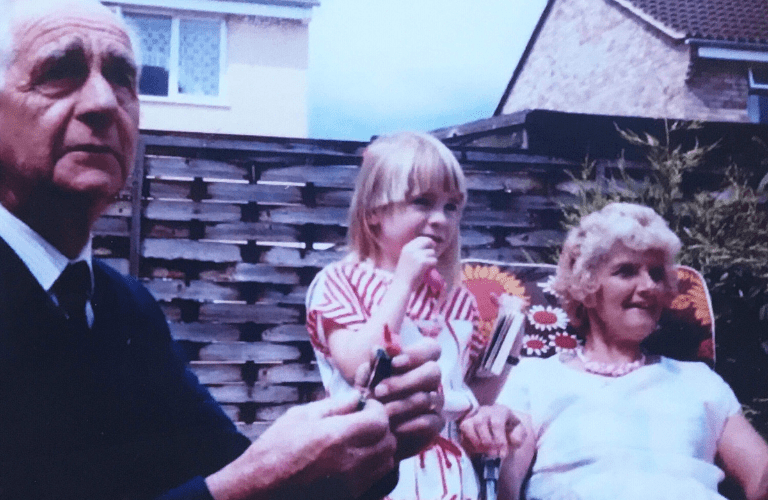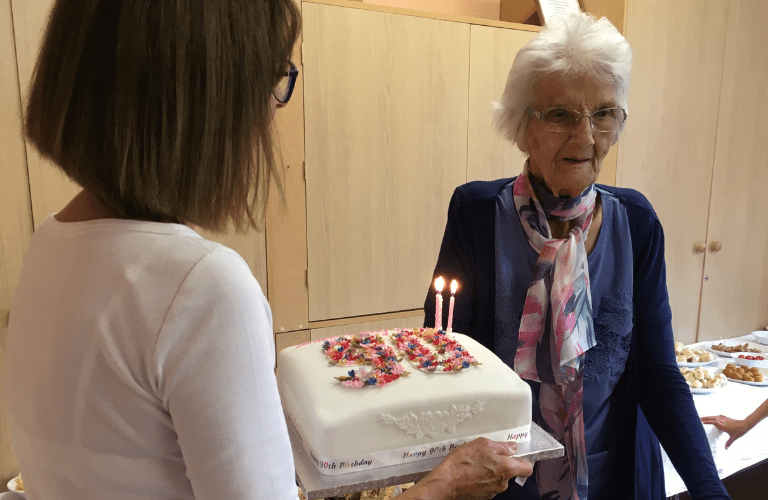Lucy's story: "I still think of Grandma every day"
Lucy shares the story of what it was like to see her grandma, Ruth, live with Alzheimer’s disease.

Lucy with her grandparents, Allan and Ruth
Everyone says their grandma is special, and mine truly was. Born in 1928, she was the first female coach driver in Herefordshire, driving for the company that she and my grandad set up. She was renowned for her dangly earrings and bright scarves, modelled for the cover of a yoga magazine, and even went abseiling at the age of 60.
Grandma and Grandad gave me, my brother and sister many unforgettable childhood experiences, including impromptu adventures in their camper van and treasure-hunting expeditions with their metal detectors.
I remember Grandma bundling me into the car in my pyjamas to chase a hot air balloon which was landing nearby, and baking such beautifully decorated cakes that I cried when we had to cut them. She taught me to play the keyboard (badly!) and once knitted over 100 toy bunnies to sell at my primary school fair.
Grandma was bereft when my grandad died of the respiratory condition chronic obstructive pulmonary disease (COPD), and I believe she never stopped missing him. But being widowed never affected her independence. For many years after his death she would whizz around in her little black Smart car, cater huge Christmas buffets for the whole family, and go on regular seaside holidays with her sister, Betty.
In later life, Grandma suffered from osteoporosis, which caused her immense pain. She had two knee replacements, but they gave her little relief. She became increasingly anxious and distressed, and we also noticed that she was becoming forgetful. We thought her little lapses of memory were quite amusing at first – she would run through the names of everyone in the family before settling on the right one.
“She couldn’t remember her name or address”
Things deteriorated when Grandma was admitted to hospital with a urinary tract infection. As a result of her confusion, she was referred to a memory clinic. My mum was with her for her first assessment and was horrified that she couldn’t remember her own address or birthday. She was diagnosed with dementia, which was confirmed as Alzheimer’s disease following a brain scan.
For the next two years, Grandma lived at home with support from carers and family. Her house and garden were her pride and joy, and she enjoyed spending time with a dementia befriender and visits to a day centre.
At no point did she seem to realise she had Alzheimer’s disease – in fact, she would nod towards other dementia sufferers whose difficulties were more obvious and say, “Look at that poor soul.”
One great blessing was that as Grandma’s dementia advanced, she no longer seemed to notice the pain from her osteoporosis, which had been unbearable at times. But as her illness progressed, she became increasingly vulnerable. She had a number of falls and began to give her possessions away.

Four generations: Lucy with her daughter, mum and grandma
The family did everything possible to help Grandma stay independent, but navigating healthcare, social services, benefits and finances was often complicated. The practical and emotional support of an Admiral Nurse would have been invaluable – but we simply didn’t know they existed.
Eventually, it became clear that Grandma couldn’t live alone anymore, and she moved into a wonderful care home just around the corner from my parents’ house. She was very unsettled at first and kept asking to go home, but my mum was able to visit every day, and until the very late stages, bring her back to her house for Sunday lunch.
“She doted on her great-grandchildren”
My husband, children and I lived a couple of hours away, but every time we ‘went home’, we visited Grandma. It was difficult to see her dementia progressing, but while she might not have been able to remember our names, her delight at seeing us was obvious.
In particular, she doted on her great-grandchildren. She and my son shared a love of buses, and she would gently stroke my daughter’s curly hair. My children were so natural with her – they would bring things to show her and talk to her with ease, even though she couldn’t really communicate with them.
Towards the end of Grandma’s life, my brother, who lives in Australia, came over to visit with his wife and baby son. Grandma clearly knew that my brother was someone dear to her, even though she hadn’t seen him for several years, and her joy when she held her youngest great-grandchild was beautiful to see.
I last saw Grandma in January 2019. For the first time, I felt that she didn’t recognise me. However, as I kissed her goodbye, she said, “Goodbye, darling,” and in that moment, I knew that she hadn’t forgotten me.
“It was a relief that she didn’t live through lockdown”
Grandma died in June 2019, just before her 91st birthday. The end was quick, and my mum was at her side, praying with her as she passed away. None of us were ready to let her go, and I wished I’d seen her one more time – I felt guilty that I hadn’t made time for a last visit.
But at the same time, we were thankful that she was no longer suffering. And now, we’re so relieved that she died before the pandemic – she wouldn’t have understood what was happening and would have been distraught that she couldn’t see her family during lockdown.

Ruth at her 90th birthday party
I still think of Grandma every day – my daughter has a photo by her bedside, so I always see her infectious smile when I say goodnight. I’m so happy that she was a part of my life for so long, even though our relationship changed as her dementia progressed.
We’re fortunate that we’re a close-knit family, and that together, we could support Grandma and each other. Nevertheless, it was a strain at times, especially on my mum.
We know that many people have less family support and fewer resources to care for their loved one, leaving them struggling alone. An Admiral Nurse would have been a lifeline throughout Grandma’s dementia, and it’s our hope that more people will be able to receive their life-changing support when they need it most.
If you would like to speak to a dementia specialist Admiral Nurse about any aspect of dementia, call 0800 888 6678 (Monday-Friday 9am-9pm, Saturday and Sunday 9am-5pm, every day except 25th December), or email helpline@dementiauk.org. If you prefer, you can book a phone or video appointment with an Admiral Nurse in our virtual clinic.
